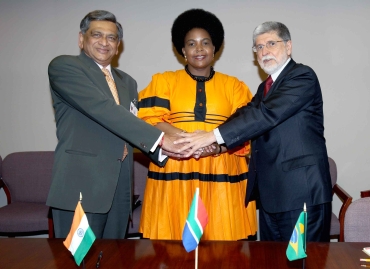 | « Back to article | Print this article |
 India has made a strong pitch for according high priority to nuclear disarmament and an early commencement of negotiations on the fissile material cut-off treaty, while insisting that it favours parleys that are 'without prejudice'.
India has made a strong pitch for according high priority to nuclear disarmament and an early commencement of negotiations on the fissile material cut-off treaty, while insisting that it favours parleys that are 'without prejudice'.
In a bid to revitalise the Conference on Disarmament, External Affairs Minister S M Krishna aligned India's position with that of the Non-Aligned Movement, and said it supports negotiations that are 'without prejudice'.
"We reaffirm our support for the CD as the single multilateral negotiating forum, recognised as such by the international community. We also support the immediate commencement of FMCT negotiations in the CD as part of its programme of work in early 2011," Krishna said at the high level meeting.
He said it is a painful reality that the aim of a nuclear-free world has remained a distant goal, and that the continued opposition to negotiations in the Conference on Disarmament has been a major obstacle.
"We call for intensification of dialogue amongst UN member states for strengthening the international consensus on disarmament and non-proliferation," he said.
Separately addressing the G4 ministerial meeting on the sidelines of the 65th UNGA on the issue of reforms in the UN, Krishna said, "We need to build the consensus further to be in a position to force, if required, the changes we seek in the Security Council. In this, the ongoing intergovernmental negotiation process remains useful and important to draw and involve a larger number of the Member States in the UNSC reform process. I would like to stress that it is very important that we remain steadfast in our demand for expansion of the Security Council in both permanent and non-permanent categories of membership".
Speaking on the IBSA ministerial meet, Krishna said, "I would like to reiterate the need for us to remain steadfast in our demand for expansion of the Security Council in both permanent and non-permanent categories of membership. Any dilution in our principled position would weaken the movement for UN reform and strengthen the hands of those who favour the status quo. "
IBSA is a trilateral, developmental initiative between India, Brazil and South Africa.
Image: External Affairs Minister S M Krishna, Foreign Minister Maite Nkoana-Mashabane of South Africa and Foreign Minister Celso Luiz Amoril of Brazil during a trilateral IBSA meting in NY | Photograph: Jay Mandal/On Assignment